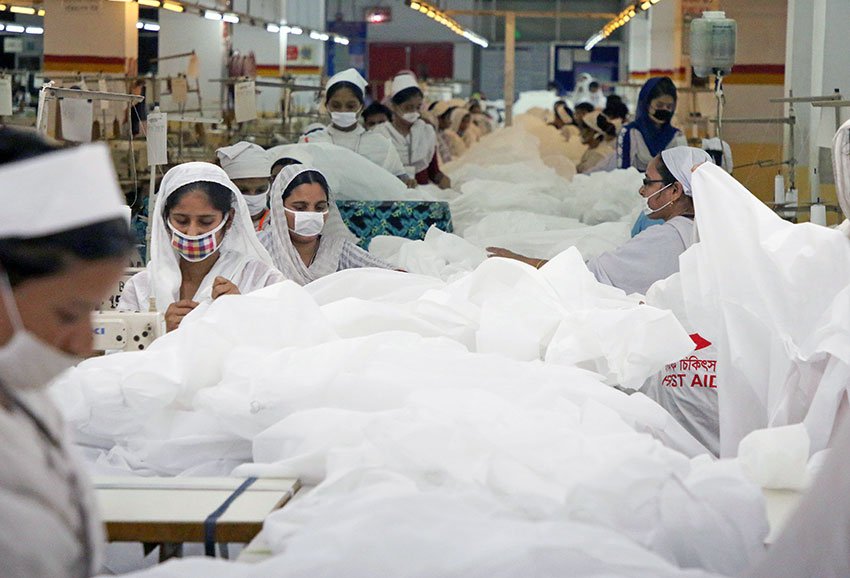Our COVID-19 Response
BUILD's Response to COVID-19
As Business Initiative Leading Development (BUILD) was gearing up to celebrate the 10th anniversary in 2020, the world faced the coronavirus pandemic, which upended people’s lives and business operations both locally and globally. Following the countrywide lockdown to restrict the spread of the deadly virus in March 2020, global agencies set out predictions of worldwide recessions for 2020, with a meagre growth of 2.3 for Bangladesh. The nationwide lockdown resulted in significant ramifications for the livelihoods, economy and most businesses and is expected to transform business models.
The COVID-19 pandemic has significantly impacted Bangladesh’s economy. The decline in national and global demand for manufactured goods, particularly in the garment sector, risks creating unemployment and deepening poverty. According to a Bangladesh Institute of Development Studies (BIDS) survey, about 13% of people have become unemployed due to the COVID-19 pandemic. Bangladesh will have 16.4 million new poor in 2020 as the working-class income in urban and rural areas has fallen sharply due to the lockdown to stop the spread of the COVID-19 pandemic.
The pandemic has affected the export and import of Bangladesh by large margins. There are concerns that the economic recession in the United States and Europe, two leading export destination of Bangladesh, is likely to be prolonged. Bangladesh has a greater reliance on trade than the other countries in the region, making the country more exposed to changes in the global economic environment due to the current pandemic. Lead time and costs increased for export and import as Chittagong Sea Port, Benapole Land Port and Airport were partly closed. The trade balance recorded a more significant deficit of USD 16.07 billion during July-May FY2019-20 compared to USD 14.98 billion in July-May FY2018-19. Import during July-May of FY2019-20 fell by 10.81% and stood at USD 49.98 billion against USD 56.03 billion of July-May, FY2018-19.
From mid-March 2020, like much of the Bangladeshi workforce, BUILD staff worked remotely for several months before a staged return to the office. We are very proud of the efforts of our staff. Despite the challenges, they continued to produce high-quality research with the Prime Minister’s Office, Ministry of Commerce, Industry, Finance (National Board of Revenue), Environment and Climate Change and Bangladesh Bank.
Since its first detection in Bangladesh on 8 March 2020, the pandemic has slowly but almost ineluctably imploded the grand dynamism of the country’s economy. The viral havoc has been not only a global health emergency but also an economic shock of epochal proportions. It has pierced the economic momentous, GDP growth projections came crashing down from more than 8% to just above 2% in 2019-2020. According to the World Bank, South Asia’s economic performance will be the worst in four decades due to the COVID-19.
As an organization committed to private sector growth and sustainable development, BUILD quickly responded to the vacuum created by the unforeseen economic fallout due to COVID-19. The experts and analysts from BUILD’s team provided a steady stream of commentary and analysis on the COVID-19 crisis from early on. BUILD adapted and updated its assessment of the situation and proposed policy suggestions for the government in synchrony with the fluid and evolving situation.

BUILD's Response
- Prepared policy paper on COVID-19
- Prepared a summary paper with comments on Special Packages announced by the government
- Organised virtual dialogues on different priority sectors to gauge their problems
- Established partnership collaboration — a private sector alliance for disaster-resilient societies, working as a network of private sector entities led by the UN Office for Disaster Risk Reduction (UNDRR)
- Translated "COVID-19 Planning Tool for SMEs", which will be posted on the website of UNDRR and ARISE for wide circulation
- Prepared a list of potential medical equipment and other COVID-19 products which has potential for investment
- Submitted special budget proposals to address COVID-19 issues
- Supported to prepare the Lockdown Exit Policy
- Maintained contacts with its partners to know their COVID-19 related issues
- Gathered data on employment, agriculture and other related sectors
- Published op-ed on foreign investment needs and other related issues

Furthermore, BUILD, International Finance Corporation (IFC) and World Bank Group under BICF 2 Program, which is funded by the Foreign, Commonwealth and Development Office (FCDO), organised a series of virtual workshops on “Health Safety Guidelines for Business Continuity and Trade Facilitation” during COVID-19 with all Customs Houses of National Board of Revenue. The key objective of the virtual workshop was to ensure business continuity following the impact of the COVID-19 pandemic. High officials from Customs House and private sector officials of the trade-related agencies participated in the workshops.
Related Documents
Overview of BUILD's COVID-19 Response
Post-Pandemic Status of CMSMEs and Effectiveness of Stimulus Packages
Our Newsletter
Listen to the pulse of the private sector development. Read our bi-monthly newsletter, Connect.
